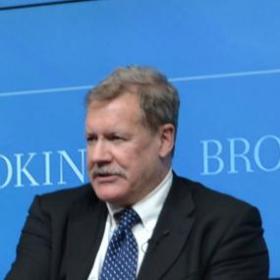
After the Flood: Pakistan and a Changed World
Greg Austin wrote this piece for his weekly column in New Europe
“Biblical scale” is the phrase in English, at least for those whose identify with the Bible as a reference point for catastrophe. There may be a similar term from other religious traditions. By any measure, the inundation in Pakistan in July was a force of nature that humankind could not have wrought. But the allusion to divine power, evoking memory of “the great flood”, should alert us to the possibility that nothing will be the same again, either for Pakistan or the world as a result of this most recent tragedy. To get a sense of the political power of nature, one might recall the inundation of East Pakistan in 1970 that fueled the political revolt by the Awami League, resulting in the break-up up of Pakistan and the creation of Bangladesh in 1971.
Though far fewer people died in the recent floods than in the 1970 inundation (some 2,000 compared with an estimated 400,000 in 1970), the physical damage this year was far greater and far more widespread. Five times as many people have been displaced in the recent floods compared with 1970, and in 2010 prices, the damage this year is estimated to be 30 times greater.
Politics is not ordained by nature (thankfully). Choices will be made by people and quite different medium term pathways for Pakistan can still be imagined. But the country has not really known peace and stability for much of its brief political history. Even though Pakistan has produced and benefited from a degree of economic prosperity and advanced culture, the darker periods and underlying fragility in the political system give reason to wonder whether the country will pull together to rehabilitate the affected people and communities.
One political factor in 1970 was key. It was the failure of the government of Pakistan to respond to the catastrophe. It was irrelevant to the critics whether this was the result of indifference or incapacity. But the government did not cope.
Forty years on, given the scale of the recent disaster, other pressures on the government of Pakistan and other demands on international sources of relief, it is easy to imagine a scenario where within six months, we see a similar situation, with a groundswell of political opposition reacting to inadequate government support.
Other analysts have issued similar warnings. My aim here is to draw a bigger picture. The world is not prepared for what may result if there is a serious revolt. The countries with greatest demonstrated capacity to respond are those of NATO and the EU. Yet even they do not have enough money, enough military or even the mentality to be a force for good in a Pakistan facing generalized political unrest among its poorest communities least able to recover from the floods. India, China, Russia and Japan will similarly be left in sideline roles.
In terms of resources, both material and spiritual, there is only one group of benefactors left who can come through in the long haul – the wealthy oil-producing Muslim countries. They are already disposed to emergency relief in Pakistan but it is unlikely that any of them is yet seized fully with a view of the dire consequences that might await them at home within ten years if they fail to move beyond emergency relief to long term rehabilitation of Pakistan.
The rehabilitation will not just be an infrastructure exercise, but a political and social trial to underpin the political cohesion and internal security of the Pakistani state. Who will step up from the Muslim world to lead this unprecedented effort of global strategic import? Will Europe and the United States follow that lead?

